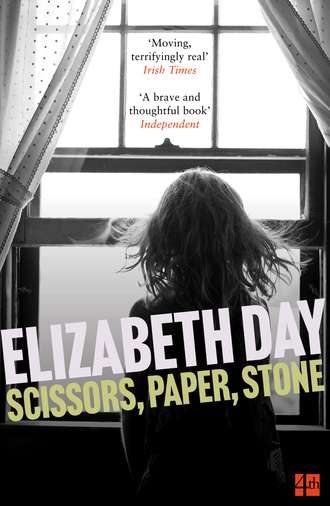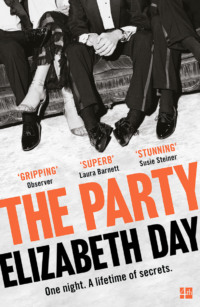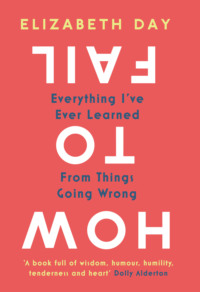
Полная версия
Scissors, Paper, Stone
‘Almost translucent,’ he had said, before dropping her arm softly back on to the sheets and turning away from her. And she remembers now how happy she had felt with that small, dispassionate compliment. Had she really asked for so little?
But that had been years ago: a different woman in a different time. When she looked round from the sink, her vision blurred with the imprecise fuzziness of tears, she saw that Charles had gone.
The nurse comes in to check on the drip and smiles at her with a brisk nod of the head, just as they do in hospital dramas. It adds to her notion of play-acting. Of course, she thinks, the nurse is in on it too. He has somehow paid off the entire hospital to go along with this joke of his. How typical, she thinks, that he would go to such lengths to make her feel so beholden to him. She feels a familiar surge in the pit of her stomach, a pang somewhere between hunger and pain that she recognises as the beginnings of a small but lethal rage.
She has got used to these sudden, inexplicable bouts of anger and now barely notices them until they have subsided. She seems to be able to swing from extreme sadness and self-pity one minute to uncontained fury the next. Recently, at the wedding of a friend’s daughter, she was given a sparkler from a packet and told to light it and hold it aloft as the happy couple left for their honeymoon.
‘It’s instead of confetti,’ said the mother of the bride, an officious woman who prided herself on her organisational skills.
‘Oh,’ said Anne, realising she was meant to be impressed. ‘How . . . inventive.’
The sparkler burned quickly, throwing out bright shards of flame like dandelion spores. The guests whooped and waved until it all seemed a curious facsimile of joy, and then the mother of the bride started ushering people into taxis and Anne was left with the sparkler in her hand, a limp, ashen strip that smelled lightly of sulphur. It struck her then, after too much champagne, that this is what happened to her inside when she felt that heated explosion of intense disappointment. It burned bright, and then it burned out, and no one ever knew.
She had wanted to talk to someone about this, about the feeling that her life was gradually draining itself of purpose, revolving around the same dull axes, but she could no longer share such intimacies with Charles and her limited scattering of dull suburban friends would have been shocked by her honesty. Until Charles’s accident, she had felt oppressed by the cyclical nature of her days, as though she were stuck on a roundabout in an anonymous provincial town like the outer fringes of Swindon or a place called Blandford Forum that she had been to once with Charles; a town that had sounded vaguely Roman and exotic but that turned out to be full of grubby teashops and Argos outlets.
The worst of it was that it had all been entirely her doing. She had loved Charles, loved him completely, and probably still did in spite of no longer wanting to. But instead of giving her the contentedness she had once craved, her life with Charles has left Anne with a perpetual restlessness. She finds fault with everything. She picks at the stitches of each day with a relentlessness that leaves the seams frayed and the material torn out of shape. She does not understand happiness any more, cannot remember where to look for it, as if it is something she has mislaid – a coin that has slipped down the back of a sofa. She cannot remember the last time she laughed. She feels her core has been chipped away like marble. She no longer likes herself very much and can feel herself being ground down by her own defensiveness. She wishes she could be different, but it somehow seems too much effort to try.
She hadn’t always been like this. When her mother died last year after a prolonged descent into blindness and infirmity, Anne had sorted through the overstuffed little retirement flat and come across an enormous cache of family letters. Sifting through the postcards of long-ago mountainsides and the browning edges of airmail envelopes, she had discovered a series of letters written while she was at boarding school. Each of them was so funny, covered with illustrations and jokes and witty imprecations not to forget to make her favourite flapjacks for the holidays. She had been stunned to meet this youthful version of herself: so effortlessly full of character, so unaffectedly joyful, so naively sure of who she was. There were so many exclamation marks. She never thought in exclamations any more.
The asthmatic, mechanical, barely-there sound of her husband’s breathing interrupts her thoughts. He is still a handsome man, she thinks, looking at the clear, pronounced angle of his jawbone jutting out from beneath his earlobe as if welded in place. The skin around his eyes has been marked by a series of fine, engraved wrinkles in the last few years, but the crow’s feet suit him; give him an approachable air of bonhomie and sunkissed good health. His eyes look like crinkles of paper, twisted at the ends like packets of picnic salt. His lids are closed now, occasionally twitching as if a small bird’s heart is thumping delicately just below the surface of his face. But when they were open, his eyes were the bruised blue of faded hydrangea petals: flat, pale, remote.
The door opens and a nurse – the nice one with the dimpled smile – peers round the door. ‘Cup of tea, Anne?’
She nods her head, just as she is supposed to.
Anne; Charles
Charles Redfern was what her mother called ‘a catch’. She spotted him on the first day of lectures, sitting at the back in a tangle of splayed-out limbs and slumped shoulders. He raised his head briefly when she walked into the auditorium and she just had time to make out the arch of his eyebrows, peaking like precisely pitched tents, before his attention turned back to the well-thumbed paperback in his hands.
She couldn’t read the title. She found out later, much later, that it had been James Joyce’s Ulysses, a book that Charles had never read in its entirety, always giving up about a third of the way through the second chapter. But he liked to carry it around with him in those first few weeks of university in order to cultivate an impression of enigmatic intelligence; an aloofness that he thought made him both attractive and indefinable.
He was right, of course. Almost every girl had a crush on Charles Redfern by the end of freshers’ week. There would be a gentle buzz of whispered giggles when he walked down the corridor. Girls pressed their noses to the glass when he jogged past their windows on the way to an early morning training session by the river for the college rowing team. He was reported to have a girlfriend at secretarial college whom someone had once met at a hunt ball and who was believed to be astonishingly glamorous with unparalleled taste in clothes.
His was the type of beauty that lost all its originality in description. He was broad-shouldered and tall and possessed of a disarming smile that crept slowly over one side of his face when he was about to laugh. His hair was the gold of hard-boiled caramel. Once, a friend back home had asked her to describe his profile and she thought immediately of him lying next to her in the hazy light of early morning.
‘He’s like a Greek god,’ she said, totally serious.
‘What kind of answer’s that?’ shrieked her friend. ‘A Greek god? You’ve got it bad.’
‘Honestly. I think he’s the most handsome man I’ve ever met.’
‘And he’s your boyfriend? Well, I think you’re awfully lucky.’
The friendship hadn’t lasted much longer after that. There was something about Charles that made her both defensive and perpetually insecure – she feared never living up to his physical superiority, never being interesting or charming enough to keep his attention, as if his eyes would always drop, after a few seconds, back to a paperback he would never read all the way through.
But – miraculously, it seemed – he claimed to be smitten with her. He started seeking her out after that first lecture, turning up at odd intervals in the porter’s lodge of her college, a scuffed leather satchel slung across his shoulder. He would be there when she went for coffee on campus, sitting at a corner table with a group of boys in rugby shirts laughing raucously and throwing the occasional, level glance in her direction. He was there, standing in between the bookshelves of the university library, his unmistakable silhouette casting its shadow over the dusty spines. He was there at a cocktail party thrown by the German Society, an event she had gone to under duress from Frieda, her friend at the time. Frieda was a self-consciously dramatic Modern Languages student who believed that men her own age were all hopelessly immature and sought out the companionship of graduate students or professors wherever she could.
‘Come along,’ said Frieda, in that curiously mocking way she had. ‘You never know who you might meet.’
So she had gone because Frieda was too forceful to refuse. As a bribe, Frieda had lent her a greeny-blue shift dress, beautifully tailored from a length of raw silk inherited from her Parisian grandmother. It was the sort of material that was rough to the touch, yet glistened as smooth as an oil slick in the evening light. She was delighted with it.
‘It suits you,’ said Frieda. ‘I am too flat-chested to carry it off.’
‘Nonsense,’ she said, unsure whether to be offended or complimented. ‘Oh, I love it. Thanks so much for lending it to me.’
‘Pleasure. I’m glad it’s getting some use.’ Frieda stopped at the mirror above the basin in the corner of her room where she had been applying her make-up. She let the mascara wand hang in her hand in mid-air. ‘My grandmother went mad, you know. She ended up in a lunatic asylum, thinking she was Marie Antoinette.’
‘Oh,’ Anne said, because she wasn’t sure what else was expected. Frieda’s conversations were full of such brutal truths, buried strangely in the middle of a perfectly normal exchange. They would surprise her with their very matter-of-factness, their sudden bleakness bringing her up short and making her feel somehow frivolous, as if she had stubbed her toe against a half-concealed boulder.
Half an hour later, they set off, arm-in-arm, not quite intimate enough to be true friends and yet not antipathetic enough towards each other to bother much about this fact. She found that university was full of such thrown-together alliances. She planned to stay for an hour at most at the cocktail party, then walk back to her room and finish an essay that was bothering her.
As soon as they walked through the door, Frieda became engrossed in conversation with a lugubrious-looking professor who bounced up and down on his tiptoes every time he got excited. She, meanwhile, hung about on the fringes, feeling rather trivial. For some reason, as she had walked through the college gardens, she had been seized with the desire to pluck a bright purple bloom from the flowerbed and put it in her hair. Frieda had looked at her disapprovingly and she saw now that Frieda had been right: it was a studiedly whimsical gesture that all at once seemed out of place here, in this dark room, filled with earnest undergraduates in elbow-patched jackets and wire-rimmed spectacles. Along one wall, a long table was half-heartedly filled with two trays of damp mushroom vol-au-vents and bowls of Twiglets. Someone had tried to make a hedgehog shape with cocktail sticks of cubed cheese and pineapple, but the sticks appeared to be too heavily weighted, so that the display looked wilted. The desultory strains of an ana-chronistic harpsichord were emanating from a slim record player in the corner.
Anne hated clubs and groups and societies as a rule – had spent most of the first half of term avoiding enthusiastic recruiters for hockey teams or film appreciation discussions – and now here she was, feeling uncomfortable and cross with herself simply because she had been too weak to say no.
She was smiling listlessly, working herself into a gradual state of agitation, and then she turned round and Charles Redfern was suddenly in front of her, holding a bulbous champagne glass filled to the brim with a violently crimson liquid.
‘I want to take you out for a drink,’ he said, as simple as that.
‘You don’t even know me.’
‘I do. I know your name is Anne Eliott. I know you are a first-year History student at Newnham College, Cambridge. I know that you are approximately 5ft 6 and that you have –’ he broke off, leaned forwards and squinted intently at her face, ‘dark brown eyes flecked with green.’
‘They’re not flecked with green.’
‘Yes, they are. You should look at them some time.’
She couldn’t think of anything to say to that. He smiled, still looking straight at her, and she noticed that the smile didn’t quite reach his eyes but stopped at the bridge of his nose. Although she never usually blushed, she could sense an unfamiliar warmth creeping up from her clavicles to her face.
‘It’s much easier to say yes now. Otherwise, I’ll have to keep pursuing you and you’ll have to keep pretending to ignore me.’
‘How do you know I’m pretending?’
‘I don’t know . . . something about the tilt of your head. When you’re concentrating on a lecture, I’ve noticed that you sit very upright. And when you’re chatting to friends or whatever, your hair sort of bobs from side to side. But when you’re pretending not to notice me, it’s neither one nor the other. You stand very still and you stare very intently at something you’re meant to be concentrating on, but there’s a slight . . . well, I suppose it’s a tremble, for want of a better word.’
‘A tremble?’
‘Yes. Like when you pretend to be asleep, but other people can tell that you’re not. Like that.’
She couldn’t say anything much for several seconds and he just kept on looking at her, gravely and with such intensity she couldn’t help but think it meant something. He seemed irrevocably in control of the situation, silently directing its progress according to some plan he had already formulated and would not be diverted from. His calm, focused insistence was intimidating but also oddly flattering. She was disarmed by his attention.
Then, just as she was preparing to say, yes, take me for a drink, I’d like that, he smiled at her, lifted his right hand so that it was just level with her cheek and quickly, so quickly she wondered afterwards if it had actually happened, brushed a tendril of her hair behind her ear, letting his fingertip graze against the nape of her neck. She breathed in, sharply. Then he turned and walked away.
So then, inevitably, she was smitten too. A week later, she ran into him again in the library, sitting at one of the long wooden desks in the reading room, rolling a cigarette.
‘Hello, Charles.’
He looked up and a grin spread slowly across his face.
‘Anne Eliott,’ he said, licking the cigarette paper. ‘When are you going to come for that drink with me?’
They cycled to a pub in Grantchester on a windy, grey day with the flat, grassy meadows spreading out beneath them like wet brushstrokes. Swans dotted the riverbanks, patches of white set with angular elegance against the murky brown water. Charles led the way, with Anne following breathlessly behind. She looked at his back, the dip and rise of his shoulders as he cycled over the ruts and bumps of the path. She saw the way his hair was just long enough to be ruffled by the breeze. She noticed that he kept checking she was keeping up, head turning just far enough to catch her eye. It felt entirely as it should.
Later, after her half shandy, he kissed her briefly on the lips and said she tasted of sherbert. Later still, he took her back to Newnham and pushed her gently against the red brick wall, taking her face in his hands and, without speaking, kissing her lips, her cheeks, her eyelids. Then, because male visitors were not allowed to stay the night, he left and she went up to her room, tingling with the quiet fizz of joy.
When she took him home two months later her parents were predictably charmed.
‘Darling, he’s wonderful,’ her mother said in a theatrical whisper, almost as soon as her father had shown him upstairs to his room. ‘What a catch!’
At supper, Charles complimented Mrs Eliott on the perfect pinkness of the roast lamb, and her mother, suffused with pleasure, let the gravy boat slip in her hand so that it almost spilled its contents all over the embroidered linen tablecloth. He engaged Mr Eliott in a lengthy and considered conversation about the American civil rights movement without ever proffering an opinion that might have been deemed overly controversial or uncomfortably radical. He seemed a perfect cut-out of everything her boyfriend should be.
‘He’s a damned sound chap, Annie,’ her father said in the drawing room the next morning, folding away his newspaper and leaning forwards to stab at the fire with a long brass poker.
‘Archie!’ said her mother, whose unnecessary horror at her husband’s language had become a sort of fond family joke.
‘I’m only saying, darling. I like him. Like his drive. You could do a lot worse, you know.’
‘I’m sure Annie knows her own mind.’ Her mother lifted her dark-grey eyes from her sewing. ‘Don’t you, darling?’
She smiled. Yes, she did. She knew her mind. But, as she was about to find out, she couldn’t have claimed to know his.
Charlotte
Charlotte was late again and although her lateness had an inevitability about it, this was never the comfort that it should have been. You’d imagine, she thought as she wove perilously in and out of the dense London traffic in her small blue car, that knowing I was going to be late would make me prepare more thoroughly in advance so that I would end up being on time. But she never quite managed the crucial leap between thought and action. Her lateness was now one of her defining features, an aspect of her personality that was gently tolerated and jovially referred to with affectionate exasperation by almost everyone who knew her. She had friends who would deliberately factor in a delay of half an hour when Charlotte arranged to meet them. But her mother was different: she could never be late for her.
She was dreading seeing her, a cold, dank dread that lay fetid and heavy across her chest. Recently, she found that she could not even pretend to relax in her mother’s presence: every time she saw her, the whole situation felt so stilted and unreal that their conversations had become defined more by the gaps between what was said than by the words themselves.
It had all stemmed from the time a few months ago when her mother turned up unannounced on the doorstep in the early morning. It was Charlotte’s thirtieth birthday, a date that she had been determined to ignore, and she recalled opening the door of her flat and being unable to disguise her horror. She had literally taken a step back, as if recoiling from her mother’s presence, attempting to get away from her.
‘Anything wrong?’ her mother said.
‘No!’ Charlotte replied, the forced jollity jarring in her ears.
‘Well. Good. Thought I’d surprise you. Happy birthday.’ And, still standing on the threshold, she had passed her a square, neatly wrapped package, the action appearing unnatural and false.
‘Thanks.’ Charlotte did not invite her in. She was still in her pyjamas, and her boyfriend, Gabriel, was splayed across the bed in a tumble of duvet and sheet. She became aware that she wanted to get rid of her mother as quickly as possible, for some reason she could not grasp. She hastily tore off the wrapping paper to reveal a shiny dark blue box with a small gold clip at one end. When Charlotte opened it, she saw a familiar silver ring, topped with a small, oval ruby set in diamonds.
‘Mum . . .’
‘I want you to have it.’
‘But, Mum,’ Charlotte felt sick. Her heart started thumping. ‘What are you doing?’
Her mother cleared her throat. ‘It doesn’t fit me any more.’ She smiled oddly. ‘Besides, who else would I give it to?’
‘It’s your engagement ring.’
‘Yes.’ And her mother had turned and let herself out of the front door without another word. There had been no time for Charlotte to say she didn’t want it.
She braked too suddenly at a set of traffic lights and her handbag fell off the front passenger seat, scattering a motley assortment of hair clips and old postage stamps into the footwell. A necklace with a broken clasp that she had been carrying in her bag for weeks had started to unravel and several tiny purple beads were rolling on to the fuzzy grey carpet. ‘Bugger,’ she said out loud, although there was no one else to hear her. She scrabbled around to put everything back inside and then the lights changed and the looming double-decker bus behind her started beeping its horn. ‘All right, All right.’
Thinking about her mother generally had this sort of effect on her. It wound her up, made her tense and simultaneously guilty for no real reason. She felt somehow responsible for her mother’s happiness and yet resentful that the burden weighed so heavily on her. She hated that she still cared enough to try to be the dutiful, supportive daughter. After all, Charlotte thought, her mother had never once said that she loved her. It wasn’t her way. Instead, she seemed perpetually disappointed: by Charlotte, by herself, by life and its accumulated disenchantments.
Her parents had never been ones for hugging or good-natured arguments around the dinner table or the rambunctious rough-and-tumble that characterised those large, semi-aristocratic families she was always reading about in period novels. There had, instead, been an unspoken friction, a constant and wordless atmosphere of slights perceived and grudges held.
Supper-times had been the worst. They would sit round the pine kitchen table, straight-backed and solicitous, with wariness in their eyes. Her father would speak first, his comments punctuated by the metronome click of his jaw as he chewed. What he said was never as bad as the way he said it. He would start off with a bland observation, usually aimed at her mother.
‘Another new top, I see.’
There would be a pause, pregnant with the electric possibility of disaster. Her mother would make a great show of looking down to see what she was wearing before assuming an unnatural informality.
‘Oh this? Yes, I bought it the other day . . .’ She trailed off, aware of his uncomfortable stare.
‘How . . . extravagant,’ he said, administering each word as if it were a drop of acid pressed from a chemist’s pipette.
‘Not really,’ her mother rallied quietly. ‘It was in the sale.’
‘Oh, I see.’ He gave a dry chuckle and wiped the corners of his mouth with the edge of a table-napkin. ‘You’re saving me money. Well, I suppose I should be grateful.’
Sometimes that would be the end of it. Sometimes her father would keep pushing and pushing until her mother would leave the table, sliding her chair back so abruptly that it would shriek discordantly against the tiled floor. On those occasions, Charlotte would be forced to stay at the table in silence until he had finished eating.
After the dinner plates had been cleared away, there would be no television because every single programme apart from the news appeared to annoy her father, darkening his moods until it seemed all the air had been squeezed to the corner of the rooms and pushed through the cracks in the walls. He would never shout, but the repressed fury of his controlled breathing was somehow worse than anything else.
The tension would be so unbearable, the need to apologise for whatever she was watching so constant in her mind, that the whole thing ended up being horribly unrelaxing. The only time she found she could watch television with impunity was just after she got home from school and just before her father returned from work, a golden period of two hours where she could sit herself on a beanbag in the front room with a slice of Battenberg cake and with the luxurious prospect of an uninterrupted session of Grange Hill and Blue Peter stretching out in front of her. Her ears were finely tuned into the precise sound of her father’s car engine. When she heard the first growling rumbles of his BMW, she would leap up, switch off the television and sprint upstairs, closing the door to her bedroom and opening her school exercise books so that she would not have to talk to him.






